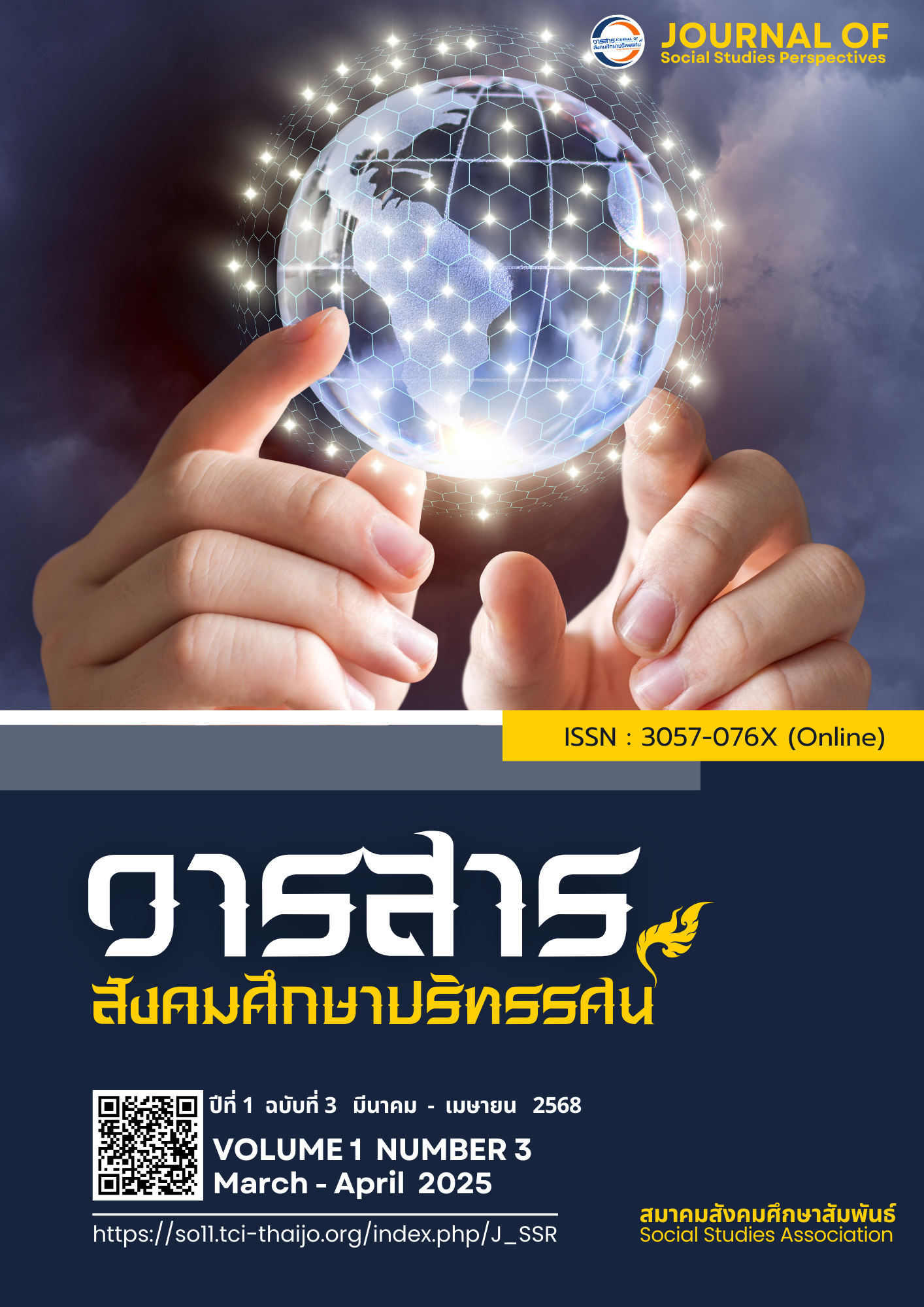THE RELATIONSHIP BETWEEN MENTAL HEALTH AND PROCRASTINATION IN UNDERGRADUATE STUDENTS
DOI:
https://doi.org/10.64186/jsp1411Keywords:
Mental health, Procrastination, Undergraduate studentsAbstract
This research aims to: 1) study the mental health and procrastination of undergraduate students 2) compare the procrastination between male and female undergraduate students 3) study the relationship between GPAX and procrastination and 4) study the relationship between mental health and procrastination. The sample were 160 undergraduate students 1-4 year. The research instruments such as socio-demographic data, depression anxiety and stress scale (DASS-21) and procrastination questionnaire. Statistics used in this study consisted of 1) descriptive statistics such as frequency, percentage, mean, and standard deviation and 2) inferential statistics were analyzed by hypotheses such as t-tests, Spearman’s rank correlation coefficient, and Pearson’s correlation coefficient. The research results that 1) undergraduate students had a moderate level of procrastination (=2.50, S.D.= 0.62) , had rare level of depression (50.6%) and stress (52.5%), anxiety at a mild level (26.3%). 2) Male and female undergraduate students no significant difference in procrastination 3) GPAX was negatively relationship with procrastination at a low level (r = -.270, p < .05) at a statistical significance level of .05 4) undergraduate students with depression showed a moderate positive relationship with procrastination (r = 0.568, p < .05) at a statistical significance level of .05, with anxiety showed a low positive relationship with procrastination (r = 0.394, p < .05) at a statistical significance level of .05 and the stress exhibited a moderate positive relationship with procrastination (r = 0.521, p < .05) at a statistical significance level of .05
References
Bolbolian, M., Asgari, S., Sefidi, F., & Zadeh, A. S. (2021). The relationship between test anxiety and academic procrastination among dental students. Journal of Education and Health Promotion, 10, 67.
Bytamar, J. M., Saed, O., & Khakpoor, S. (2020). Emotion regulation difficulties and academic procrastination. Frontiers in Psychology, 11, 524588.
Chuthong, R., Wiwatthanaworaset, P., Buatong, N., Nuthong, Y., Yusuk, C., Rungruang, N., Mad-Awa, N., Saelim, P., Chaitaveesap, P., Chicharoen, P., Jantsuwun, R., & Srayuthpitak, O. (2019). Mental health status and the role of families in undergraduate students at a university in southern Thailand. Journal of the Psychiatric Association of Thailand, 64(4), 337–350.
Cjuno, J., Palomino-Ccasa, J., Silva-Fernandez, R. G., Soncco-Aquino, M., Lumba-Bautista, O., & Hernández, R. M. (2023). Academic procrastination, depressive symptoms and suicidal ideation in university students: A look during the pandemic. Iranian Journal of Psychiatry, 18(1). 11-17.
Cohen, J. (1977). Statistical power analysis for the behavioral sciences (2nd ed.). Academic Press.
Custer, N. (2018). Test anxiety and academic procrastination among prelicensure nursing students. Nurse Educator, 39(3), 162-163.
Desai, M., Pandit, U., Nerurkar, A., Verma, C., & Gandhi, S. (2021). Test anxiety and procrastination in physiotherapy students. Journal of Education and Health Promotion, 10, 132.
Ferrari, J. R., Johnson, J. L., & McCown, W. G. (1995). Procrastination and task avoidance: Theory, research, and treatment. Plenum Press.
Gohain, R. R., & Gogoi, S. (2020). Academic procrastination among university students: A gender-based study. Asian Journal of Home Science, 15(2), 399-403.
Hayat, A. A., Kojuri, J., & Mitra Amini, M. D. (2020). Academic procrastination of medical
students: The role of Internet addiction. Journal of Advances in Medical Education &
Professionalism, 8(2), 83-89.
Jiang F. (2024). The relationship of academic procrastination on non-English majors' English
classroom anxiety: A moderated mediation model. Frontiers in Psychology, 15,
Mushtaque, I., Awais-E-Yazdan, M., & Waqas, H. (2022). Technostress and medical students’
intention to use online learning during the COVID-19 pandemic in Pakistan: The
moderating effect of computer self-efficacy. Cogent. Education, 9(1).
Oei, T. P., Sawang, S., Goh, Y. W., & Mukhtar, F. (2013). Using the Depression Anxiety Stress
Scale 21 (DASS-21) across cultures. International Journal of Psychology, 48(6), 1018-
Office of Registration and Student Statistics, Prince of Songkla University, Pattani Campus.
(2024). Online registration and student statistics report for the year 2024.
Punyawong, V., Santithadakul, R., & Phavasuthipaisit, C. (2020). Prevalence of depression and
suicide risk in Thai adolescents: A survey in 13 health regions. Journal of Mental
Thailand, 28(2).
Phuprasom, N. (2021). The situation of student health in Thailand 2021. School-Age Children's Health Group, Health Promotion Division, Department of Health.
Ragusa, A., González-Bernal, J., Trigueros, R., Caggiano, V., Navarro, N., Minguez-Minguez, L., A., Obregón, A. I., & Fernandez-Ortega, C. (2023). Effects of academic self-regulation on procrastination, academic stress and anxiety, resilience and academic performance in a sample of Spanish secondary school students. Frontiers in Psychology, 14, 1073529.
Sanitluea, N., Satphet, W., & Napha-arak, Y. (2019). Sample size calculation using G*Power program. Academic Journal Suvarnabhumi Institute of Technology, 41(1), 497–507 (in Thai).
Saplavska, J., & Jerkunkova, A. (2018). Academic procrastination and anxiety among students.
In Proceedings of the 17th International Scientific Conference Engineering for Rural
Development (pp. 1192–1197). Latvia University of Life Sciences and Technologies.
Siaputra, I. B. (2010). Temporal Motion Theory: Best Theory (yet) to Explain Procrastination.
Sonthung, M. (2019). The effects of group counseling based on the cognitive-behavioral
approach on academic procrastination in undergraduate students (Master's thesis).
Department of Counseling Psychology, Faculty of Social Sciences, Chiang Mai University.
a detrimental habit. Frontiers in Psychology, 13.
Svartdal, F., Dahl, T. I., Gamst-Klaussen, T., Koppenborg, M., & Klingsieck, K. B. (2020). How study environments foster academic procrastination: Overview and recommendations. Frontiers in Psychology, 11, 540910.
Taveerat, P. (1997). Methods of research in behavioral and social sciences (7th ed.). Bangkok: Educational Testing and Psychological Service, Srinakharinwirot University.
UNICEF, & Department of Mental Health. (2021). Covid-19 pandemic continues to drive poor mental health among children and young people. https//www.unicef.org/thailand/press-releases /covid-19-pandemic-continues-drive-poormental-health-among-children-and-young-people
Downloads
Published
How to Cite
License
Copyright (c) 2025 Journal of social studies perspectives

This work is licensed under a Creative Commons Attribution-NonCommercial-NoDerivatives 4.0 International License.
The article is published under the Creative Commons Attribution-NonCommercial-NoDerivatives 4.0 International (CC BY-NC-ND 4.0) license, which allows others to share the article while giving appropriate credit to the author. It prohibits the use of the article for commercial purposes or the creation of derivative works. Any other reuse or reproduction requires permission from the journal.










